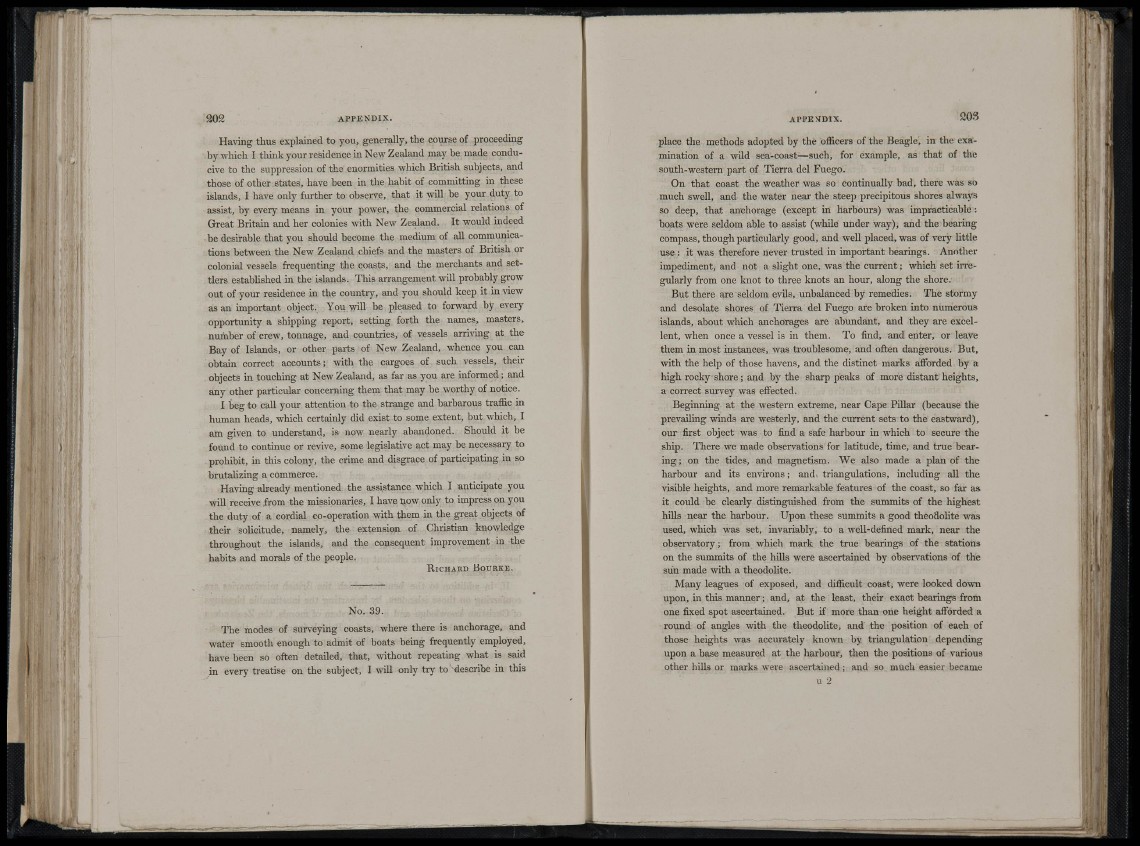
; .1
i :
l^i' I f if
rfli ! l'r^ï
202 A P P E N D I X .
Ha™g thus explained to you, generally, the course of proceeding
by which I think your residence in New Zealand may be made conducive
to the suppression of the enormities which British subjects, and
those of other states, have been in the habit of committing in these
islands, I have only further to observe, that it \vill be your duty to
assist, by every means in your power, the commercial relations of
Great Britain and her colonies with New Zeidand. It would indeed
be desirable that you should become the medium of all communications
between the New Zealand chiefs and the masters of British or
colonial vessels frequenting the coasts, and the merchants and settlers
established in the islands. Tliis an-angement will probably grow
out of your residence in the country, and you should keep it in view
as an important object. You wiU be pleased to forward by every
opportunity a shipping report, setting forth the names, masters,
number of crew, tonnage, and countries, of vessels arriving at the
Bay of Islands, or other parts of New Zealand, whence you can
obtain correct accounts; with the cargoes of such vessels, their
objects in touching at New Zealand, as far as you are informed; and
any other particular' concerning them that may be worthy of notice.
I beg to call your attention to the strange and barbarous traffic m
human heads, which certainly did exist to some extent, but wliich, I
am given to understand, is now nearly abandoned.. Should it be
found to continue or revive, some legislative act may he necessary to
prohibit, in this colony, the crime and disgrace of participating in so
brutalizing a commerce.
Having already mentioned the assistance which I anticipate you
will receive from the missionaries, I have now only to impress on you
the duty of a cordial co-operation with them in the great objects of
their solicitude, namely, the extension of Christian knowledge
throughout the islands, and the consequent improvement in the
habits and morals of the people.
RICHARD BOURKE.
No. 39.
The modes of surveying coasts, where there is anchorage, and
water smooth enough to admit of boats being frequently employed,
have been so often detailed, that, without repeating what is said
in every treatise on the subject, I will only try to -describe in this
APPENDIX. Q03
place the methods adopted by the officers of the Beagle, in the examination
of a wild sea-coast—such, for example, as that of the
south-western part of Tierra del Fuego.
On that coast the weather was so contmuaUy bad, there was so
much swell, and the water near the steep precipitous shores always
so deep, that anchorage (except in harbours) was impracticable :
boats were seldom able to assist (while under way), and the bearing
compass, though particularly good, and well placed, was of very Uttle
use : it was therefore never trusted in important bearings. Another
impediment, and not a slight one. was the current ; which set irregularly
from one knot to three knots an hour, along the shore.
But there are seldom evils, unbalanced by remedies. The stormy
and desolate shores of Tierra del Fuego are broken into numerous
islands, about which anchorages are abundant, and they are excellent,
when once a vessel is in them. To find, and enter, or leave
them in most instances, was troublesome, and often dangerous. But,
with the help of those havens, and the distinct marks afforded by a
high rocky shore ; and by the sharp peaks of more distant heights,
a correct survey was effected.
Beginning at the western extreme, near Cape Pillar (because the
prevailing winds are westerly, and the current sets to the eastward),
our first object was to find a safe harbour in which to secure the
ship. There we made observations for latitude, time, and true bearing;
on the tides, and magnetism. We also made a plan of the
harbour and its environs ; and> triangulations, including all the
visible heights, and more remarkable features of the coast, so far as
it could be clearly distinguished from the summits of the highest
hiUs near the harbour. Upon these summits a good theodolite was
used, which was set, invariably, to a weU-defined mark, near the
observatory ; from which mark the true bearings of the stations
on the summits of the hiBs were ascertained by observations of the
sun made with a theodohte.
Many leagues of exposed, and difficult coast, were looked down
upon, in this manner ; and, at the least, their exact bearings from
one fixed spot ascertained. But if more than one height afforded a
round of angles with the theodohte, and the position of each of
those heights was accurately known by triangulation depending
upon a base measured at the harbour, then the positions of various
other hills or marks were ascertained ; and so much easier became
u 2